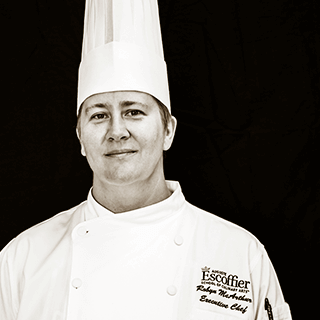Listen to This Article:
Imagine your ideal vacation. Maybe you’re relaxing under a palm tree on a white sandy beach or backpacking through rugged mountains featuring breathtaking views. Or maybe you’re like a growing number of travelers who enjoy experiencing a new culture through unique dining experiences and locally sourced ingredients.
Picture unwinding in a private villa in the Napa Valley vineyards, partaking in private tastings, and indulging in local Meyer lemons and Dungeness crab. Food can serve as a powerful lens, allowing us to more fully experience new destinations, which is one reason food tourism is a growing trend.
According to some private-sector research, a majority of travelers research restaurants before heading out on vacation. But some travelers take it a step further. A recent report by the World Travel Association (WFTA) found that 34% of travelers select their destination based on food.
This growing interest in connecting travel and the culinary world raises the questions: What is food tourism and what careers exist in the industry?
What Is Food Tourism?
Food tourism, also known as culinary tourism, is travel related to visiting a specific destination to try the local food and experience the local culture.
What Are Some Examples of Food Tourism?
- Traveling to New Orleans to try authentic dishes and drinks like Creole Jambalaya, beignets, and a hurricane cocktail
- Visiting Italy, to indulge in pizza, pasta, and gelato the way it was meant to taste
- Staying in Spain, to experience heritage recipes for paella, tapas, and churros
- Venturing over to Japan, to experience sushi, ramen, and tempura made by locals
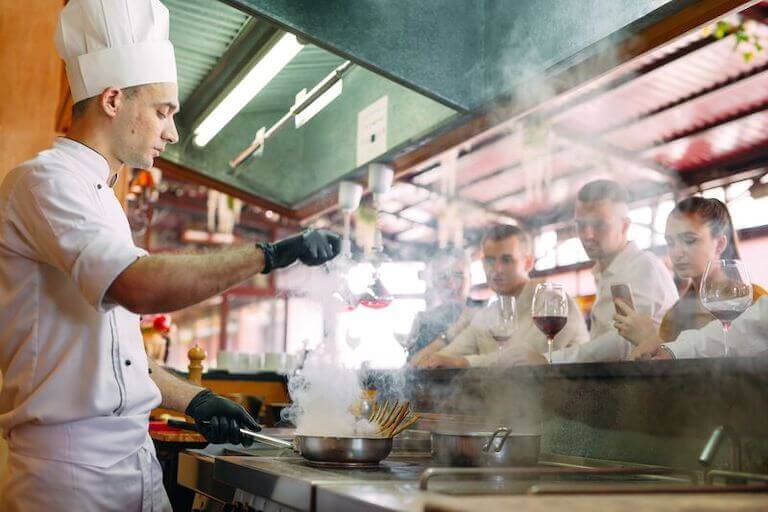
Tourists enjoy interacting with chefs as their meals are prepared.
Travelers are looking to learn more about the regions they travel to through food experiences such as farm-to-table tours and restaurants, trips through local markets, and interacting with the chef as their food is prepared. They’re looking for local flavors and specialties they can’t find anywhere else, which is creating unique opportunities for creative chefs.
Food tourism experiences can also help preserve traditional cooking methods and regional cuisines, ensuring their legacy lives on for future generations. It’s a win-win situation for locals and travelers alike.
Why Is Food Tourism so Popular?
While the term “foodie” arrived on the food scene in the 1980s, it began to gain steam in the 1990s when food television grew in popularity. The foodie community began to connect even more once the internet and social media made it easier to share and follow each others’ experiences and the works of celebrity chefs.
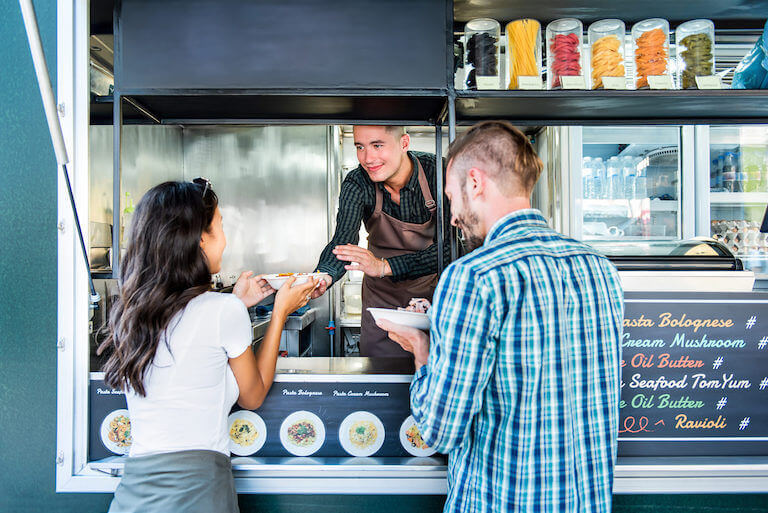
Food trucks grew in popularity along with the foodie scene.
In fact, the majority of Millennials and Gen Z would rather spend their money on experiences like traveling instead of saving for the future. In addition, they have become more interested in experiencing authentic culture as they travel instead of wanting to see landmarks or visit popular theme parks.
The younger generations want to move past sightseeing and see how the locals are living—and eating. Why visit a predictable amusement park when you could take a small catamaran to an island off the coast of Mexico where you can eat homemade tortillas prepared by the locals?
And it doesn’t appear to be a fading trend. The food tourism market is strong and expected to continue growing by 15.20% through 2033. With this in mind, it brings new and innovative opportunities for chefs looking to put a different spin on their careers.
Culinary Tourism Creates Exciting Career Opportunities
The increasing popularity of culinary tourism is creating unique opportunities for both chefs and food influencers. There are many ways you can combine your passion for food, culinary experiences, travel, or your local area into money-making opportunities.
Opportunities for Those Who Love to Travel
Do you want to see the world? Or do you have a favorite destination that you’d love to live in long-term or temporarily? There are many opportunities around the world for chefs and others passionate about cuisine in the food tourism industry. If you want to be part of it, here are some ideas for how you can combine your career and hobbies:
1. Partner with Tour Companies
You can partner with travel agencies and tour operators to create one-of-a-kind experiences for travelers. This could include taking groups to local farms and markets to purchase ingredients and educating them on the significance of the ingredients in the local culture throughout history. Escoffier’s Farm To Table Experience offers great examples of how local farming can influence culinary culture.

Food tourists are interested in learning more about the local food scene, including where to source ingredients, like the farmer’s market.
2. Cook for Guests as a Private Chef on a Yacht
Create a luxurious dining experience by working as a private chef on a yacht. You can personalize multi-course meals for private clients or charter guests while incorporating local ingredients from exotic destinations. You get the bonus of stunning ocean views day and night. Several professional organizations exist that can help you on your personal chef journey, including the United States Personal Chef Association and the American Personal & Private Chef Association (founded by friend of Escoffier Candy Wallace).
3. Join Adventure Groups as an Expedition Chef
If you enjoy trekking through the mountains, join an adventure tour company like Overland Cookery. You can prepare meals for hikers and campers throughout their journey. Or, you could prepare delicious meals for travelers to return to after an adventurous day of spotting animals on a South African safari. Get creative thinking about your favorite place to travel and how you could be a part of creating an unforgettable food experience for others.
4. Hit the Road as a Food Influencer
Professional chefs have a unique voice and experience to add to the world of food influencers. If you enjoy travel, you could spend your time traveling while learning about and sharing food experiences with others online. You can help foodies plan their next vacation by covering the best food to try and experiences to participate in throughout the world.
The Food Entrepreneurship Courses at Escoffier include classes in social media content development, food blogging, and hospitality marketing that can help you take the next step.
5. Provide Services as a Restaurant Consultant
Lend your culinary knowledge and experience to restaurants around the world. You can assist restaurants in menu development, improved food quality, and staff training. Become known as the expert in a specific culinary area and travel to teach others how they can do the same. Explore ways a degree in Hospitality and Restaurant Operations Management can help.
Opportunities for Those Who Want to Stay Local
You don’t have to travel to work in and support the world of culinary tourism if you want to stay close to home. There are plenty of opportunities, including the following, for chefs looking to stay local.
1. Host Cooking Classes
Host cooking classes to teach tourists about local culinary techniques and regional dishes. Educate participants on the differences in your local ingredients. Incorporate pieces of local history and storytelling throughout the experience to engage tourists and help them learn more about your area and culture.
2. Participate in Food Festivals
Food festivals, such as the South Beach Wine & Food Festival and Disney California Adventure Food & Wine Festival, are popular among foodies. Join a festival in your area or partner with other food experts to start a food festival to attract tourists. You can provide culinary demonstrations to showcase your skills and promote your region’s culinary heritage.
3. Work as a Private Chef
With the help of companies like Airbnb, many travelers enjoy staying at a house instead of a hotel or resort while traveling. You can help them enjoy an authentic experience by working as a private chef for their trip. You can prepare a lavish spread using local ingredients while customizing the menu for specific travelers.
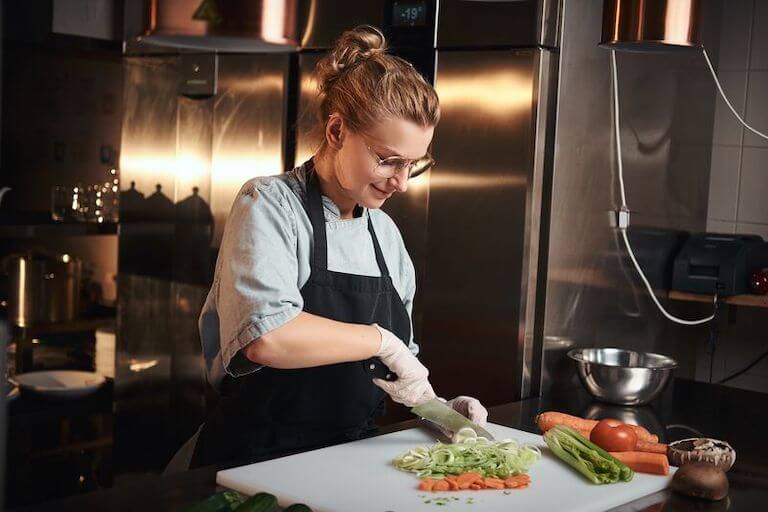
Private chefs can help tourists enjoy authentic cuisine at every meal.
4. Food Tour Guide
Help take travelers past the tourist hotspots to find the best authentic dishes and culinary experiences the locals love in your city. Lead groups to the best restaurants, sharing what dishes will meet their needs. Take them on behind-the-scenes tours of the restaurants or create experiences where they can meet the Executive Chef.
5. Develop Local Food Tourism Opportunities
With the increase in food tourism, cities are working to create new experiences to help draw tourists. There are many ways you can partner with local government and business owners to put your city on the food tourism map. Here are some ideas to get you started:
- Create themed menus for restaurants in your local area.
- Collaborate with local producers, from farmers to cheesemakers and artisanal bakers, to source fresh local ingredients for your dishes.
- Offer special tasting events featuring local ingredients and specialties.
- Work as a food tourism advocate. Connect with other local chefs, restaurants, and food businesses to bring new culinary offerings to your area.
The food tourism industry is wide open. Look for ways to pair your culinary skills with other passions to create one-of-a-kind experiences for travelers from near and far.
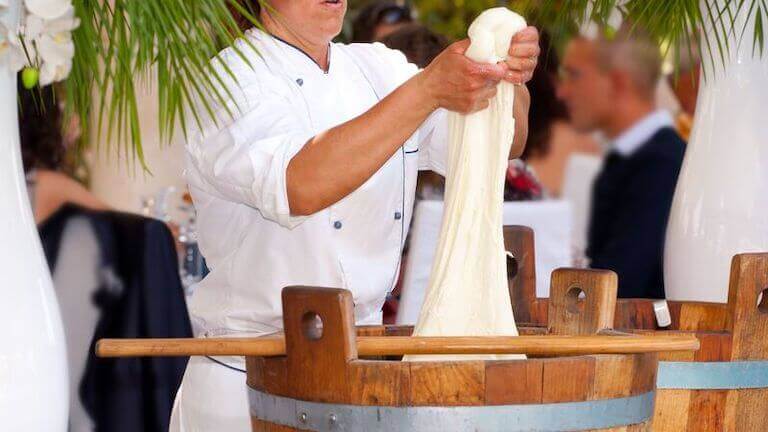
Providing unique culinary experiences and behind-the-scenes experiences can draw tourists.
If the food tourism industry is calling your name, you can set yourself apart from other chefs by developing additional skills that will help you serve in these unique career opportunities.
Non-Culinary Skills for Success in Food Tourism
Food tourism is about more than just local ingredients and cooking. Outside of your culinary skills, the following skills can help you succeed in a career in the culinary tourism industry:
- Storytelling Skills: Creating the authentic experience tourists are looking for includes good communication skills and being a captivating storyteller. Share local heritage and cultural narratives throughout the culinary experience. Engage with people to share your local knowledge and answer their questions to create a personalized experience.
- Business Acumen: Understanding business principles such as marketing and promotion can help you attract customers to your culinary experience while understanding the numbers behind the business will help you price your offerings right.
- Cultural sensitivity: Food is deeply connected with local culture, and having cultural sensitivity helps you communicate local and historical traditions in a meaningful way.
Combining these skills can help you create one-of-a-kind experiences for travelers while establishing yourself in a career that you can enjoy personally and professionally. If you’re interested in starting your own business in the food tourism industry, explore how a food entrepreneurship program can help you get started.
How to Take the Next Step for a Career in Food Tourism
Food tourism is a travel trend that is here to stay. It provides transformative experiences for travelers, allowing them to immerse themselves in unique flavors, local culture, and regional traditions.
The travel landscape continues to evolve with the changing generations, creating new and exciting opportunities in the culinary and hospitality world. If you’re passionate about food and enjoy creating unique experiences along with delicious cuisine, a career in food tourism might be right for you. Contact us to learn more about how you can combine your interests and passions with an exciting career in culinary tourism.
CHECK OUT THESE ARTICLES NEXT!
- Career Options For Culinary School Graduates
- What Skills Do You Need for a Career in Hospitality and Tourism?
- How You Can Get a Job on a Cruise Ship
*Information may not reflect every student’s experience. Results and outcomes may be based on several factors, such as geographical region or previous experience.


